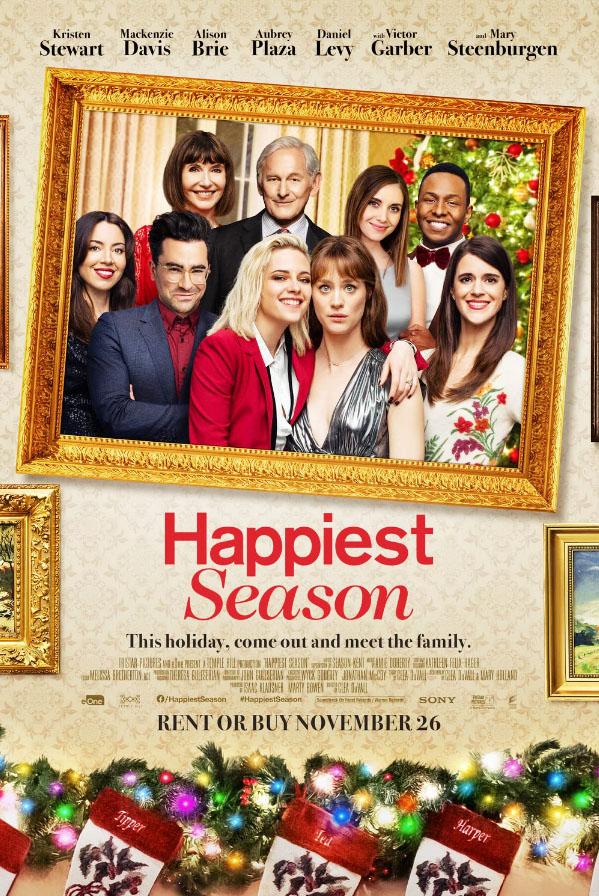In the first fifteen minutes of Clea DuVall’s romantic comedy “Happiest Season”, the film has delivered a slew of well-worn tropes that align it with a long and storied line of similar romantic comedies and holiday films. It’s part of the film’s entire cadence that each plot-point feels telegraphed a few scenes before, and the film’s ultimate (attempted) heart-warming ending feels assured from the opening moments. It’s baked into its genre, and yet the ways that “Happiest Season” develops over the course of its 100 minutes makes it feel less and less satisfying the more it goes on.
The central, familiar, plot-point that sets everything up is the meet-the-parents kerfuffle. Yin and yan pair, Harper and Abby, are a couple in the throes of young love. At the opening, their biggest crisis seems to be that Harper loves Christmas, and Abby seems ambivalent. In a moment of bliss, Harper invites Abby to her parents for Christmas, rather than have the orphaned Abby spend the holiday alone. Abby warms to the idea. At first. Except, on the way to there, Harper reveals to Abby that she has not actually come out to her parents, throwing the first of a number of wrenches into this planned holiday and Abby’s planned proposal. The couple must feign heterosexuality while on holiday.
Ted, Harper’s dad, is running for office and is using the family’s Christmas-eve party to get support from a major donor, so it’s important that the entire family ensure they have no secrets to hide. Uh-oh. The situation worsens because of the dysfunctional dynamic with Harper’s two sisters – ignored and ditzy Jane, and icy-cold Sloane. Their presence has the already harried couple walking on eggshells. The tension is compounded with the appearance of Harper’s ex-boyfriend. He and her parents feel a rapprochement is due. And for good measure, Harper’s (secret) ex-girlfriend enters the picture, as a romantic and character foil, for good measure. It’s a full house of chaos.
If this all feels a bit contrived, that’s because it is. “Happiest Season” brings equality to toothless romantic comedies by centring a lesbian couple to show that the banal toxicity of relationships is just as present in the queer community. On some level, it feels curmudgeonly to be too critical of the attempted warmth of a holiday film that simply wishes to be easy and sweet. But in addition to never making good on its title, “Happiest Season” feels more tired and effortful than buoyant and light. It means something for representation that lesbians, so often ignored in LGBT cinema, have their own trite bauble of a Christmas film too. But even in the realm of superficiality that comes with holiday-romance, “Happiest Season” feels particularly devoid of anything incisive. The queer dynamics at play feel limited since the film’s perspective of the relationship at its centre feels shackled to a heteronormative idea of how relationships work. I might be inclined to tone down any intense socio-cultural critique of the situation, if the film was at least fun. And the greatest crime is that “Happiest Season” is neutered as a romance, and ungainly as a comedy.
Kristen Stewart’s Abby is an unlikely romantic comedy lead, mostly because of the way her Abby seems more worn down by her relationship than anything else. Even if her dourness seems out of place in a “comedy,” she’s committed to a character arc for Abby and that’s the film’s strongest point. Amidst a sea of contrivances, Stewart is working hard to legitimise the ridiculousness of the situations around her, even managing to valiantly commit to the increasing line of weird things that happen to her. But her performance is fitted to another film, and feels desperate for a better – or different – romantic pairing. There are brief moments of charm from Mackenzie Davis but, as written, Harper is the film’s most shoddily constructed character. DuVall leaves it for the actors to convince us why the pair should be together, but there’s nothing textually for Davis to work with so the film leaves us either rooting for an alternate pairing that’s briefly teased, or better yet for Harper’s entire family to exit the narrative. If only. It’s telling that typically dependable performers like Victor Garber, Mary Steenburgen and Alison Brie struggle to turn their flat characters into bearable people.
There’s always a series of mental gymnastics that romantic comedies depend on. We’re seduced into finding behaviours that would exhaust in real life charming. Hypocrisy and lies are played off as mere roadblocks to love. To be loved merely depends on pretty clothes, lovely homes and charming personalities but there’s a crippling defect in the central pillar of lies holding up “Happiest Season”. The film’s undertones suggest a film that is nastier, with characters barely tapped into their own awfulness, but the film seems unaware of that, instead treating the underhand machinations as building blocks to an effortful end that feels out-of-place. The two strands don’t mix, and in its wake “Happiest Season” feels incredibly false. It’s a falsity that’s unassisted by the flatness of the visual aesthetic that projects conservative perfection, but rarely uses the camera to mine the chaotic environment for potential moments of humour.
It’s an easy watch, and it finishes before it completely wears out its welcome but “Happiest Season” has little to suggest longevity. Even as it means well. If “Happiest Season” is arriving to bring a wave of equality to the romantic holiday genre, it’s a shame that the sound of the sleigh-bells announcing its arrival feel so tinny and hollow.
Happiest Season is a Hulu release and is available outside of the US on Prime Video and iTunes.


